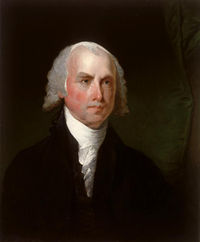My cherie and I spent part of a recent drive in Florida reading and discussing Thomas Paine’s 1797 pamphlet “Agrarian Justice,” a document both of its time and surprisingly prescient. AJ’s central premise and proposals grew from Paine’s reflections on natural rights throughout the course of his career. Briefly: private property was responsible for all that was best and worst in “civilized” countries. Property rights encouraged cultivation and increased productivity, such that agrarian countries could support ten times as many people as hunter-gatherer societies of equivalent territory. On the other hand, property produced a grotesque level of inequality, such that the most “degraded” people in the world lived cheek-by-jowl with the richest. Paine’s solution to the latter problem was not to eliminate property rights and agrarian civilization altogether, but to assert that all people had a property right that governments must secure to them: their collective ownership of land’s pre-improvement value, together with an equivalent fraction of the value of personal property. (He guesstimated that each fraction was about ten percent.) He grounded these rights in the assumption that land before improvement was the common property of all, and that part of the value of personalty came from “society,” which provided the labor markets, intellectual capital, and other structures that facilitated creation of that property. Governments - he addressed himself to his fellow revolutionaries in France and his former countrymen in England - should detach these fractions from property owners by way of a tax, and return it to all citizens by way of cash payments. Paine proposed an inheritance tax as least intrusive, since dead men needed little money and their children would eventually get part of the exaction transferred back to them. As for the payments themselves, AJ proposed giving every man and woman 15 pounds (the equivalent of about $3000 today) when they reached the age of 21, a “social dividend” that would help them set up an independent household and farm; in addition, every person over the age of 50, and every disabled person below that age, would receive L10 annually for their support. It is worth noting that Paine calculated the average adult life expectancy at 51 years, and the number of younger disabled people as fairly small. Nonetheless, his proposals are viewed today (by the American Social Security Administration, inter alia) as one of the intellectual foundations of social insurance, a feature of most modern nation-states.
Citizen Paine expected the rich and powerful to oppose his tax on legacies rather than his payouts to the young and old. Two centuries of subsequent experience with the kind of social insurance program proposed in “Agrarian Justice” suggests the elite would actually oppose pensions and social dividends more than the supporting taxes. Their sticking point was and is Paine’s characterization of these payments as rights. In the Anglo-American world, at least, the upper classes have long been nervous about rights language, which might give the lower orders ideas above their station, and preferred to think instead of charity. Charity affirms the status and power of the giver and the humility and dependence of the recipient. The highborn sometimes even think of employment as a charitable enterprise: in the eighteenth century English gentleman so characterized their hiring of craftsmen and servants, and in our own time the American Republican Party, appanage of the plutocratic order, has proposed replacing Labor Day with “Job Creators’ Day,” to celebrate the generosity of management toward the plebeians. In an aside, Paine noted that the personal wealth of employers often came from their underpaying of their workers. He was, perhaps, insufficiently cynical, insofar as he could not see that the owner class preferred not to pay their workers at all, unless they could see those workers grovel for their pittance. Nor do I think he could have predicted that such attitudes would persist for over 225 years, and likely for another 225 after that.












